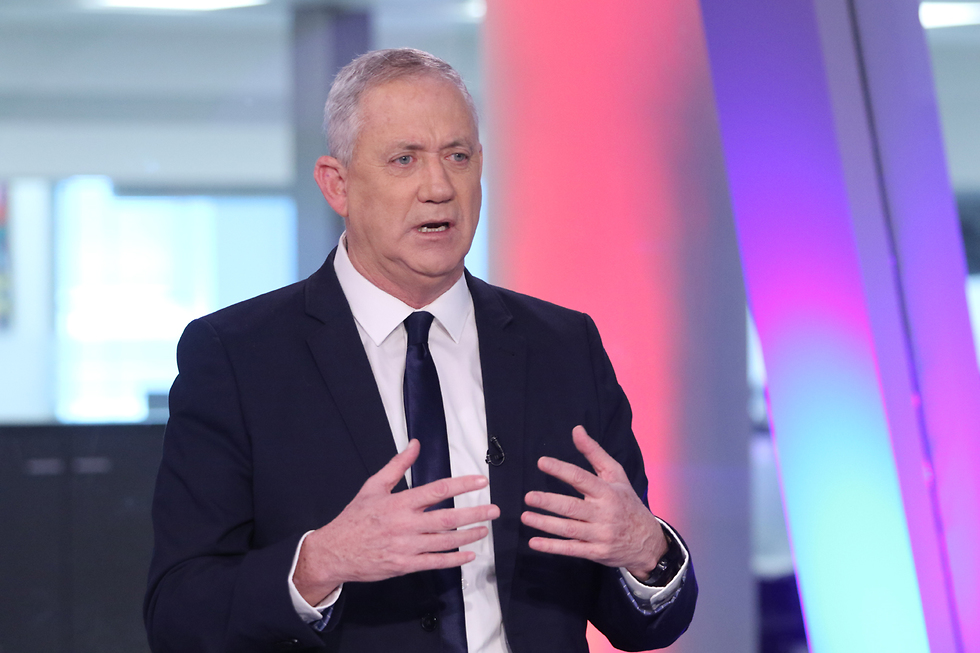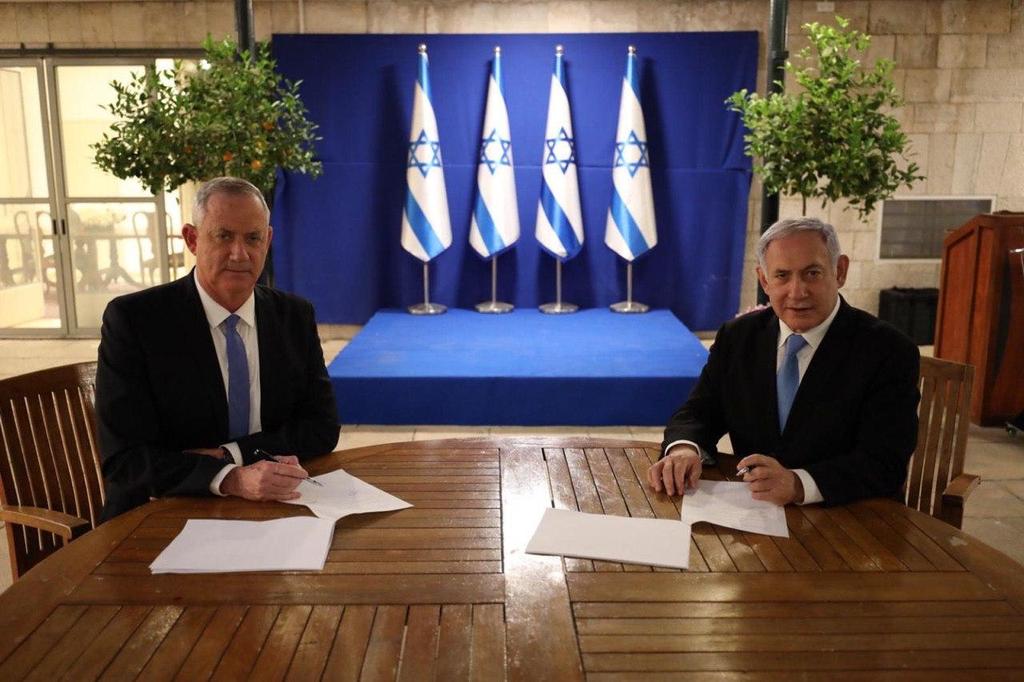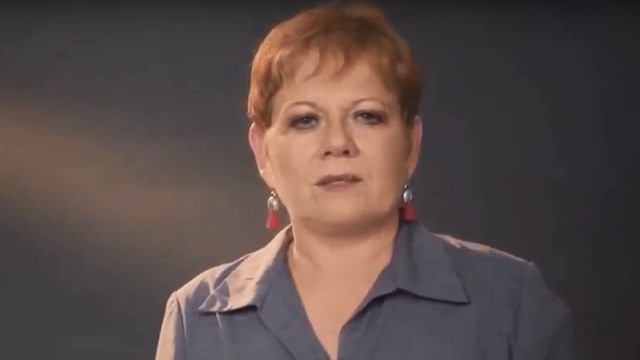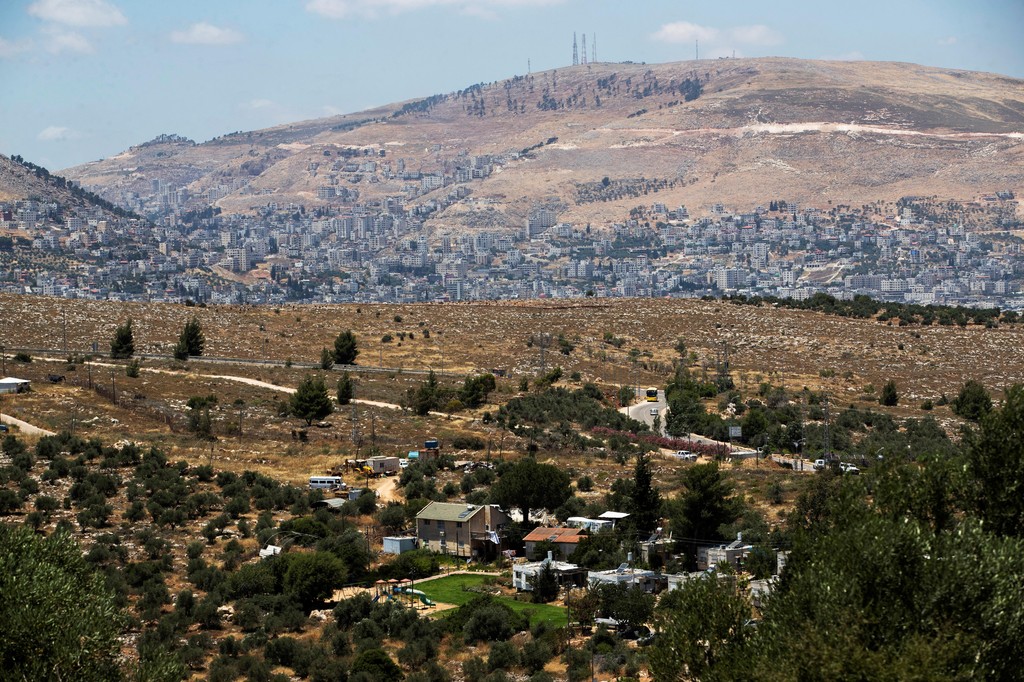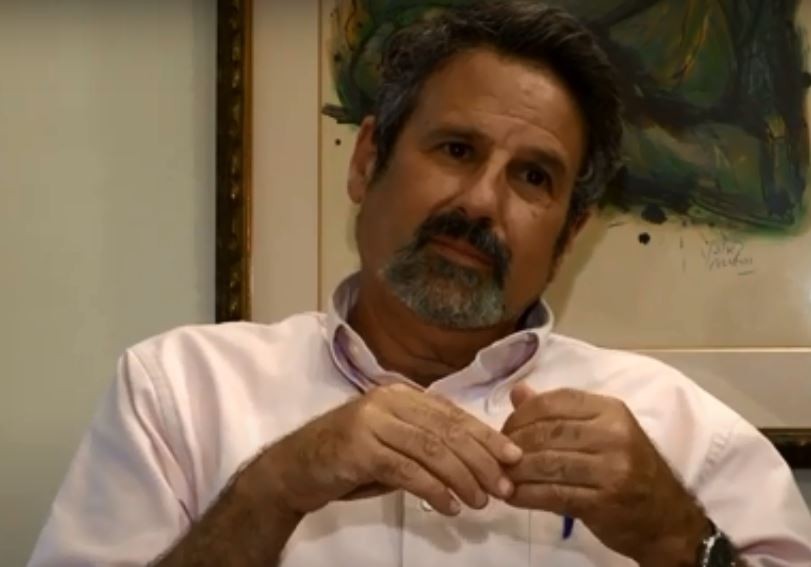Getting your Trinity Audio player ready...
Barely a month after its prolonged and rocky inception, the “unity government” headed by Prime Minister Benjamin Netanyahu and Defense Minister Benny Gantz seems anything but unified.
Given Netanyahu’s demands for a single-year budget as opposed to the agreed-upon two-year plan, the recent opinion polls placing Gantz’s Blue & White party in the single digits, the ongoing arguments surrounding West Bank annexation and a bevy of other minor conflicts, the common assumption around Jerusalem is that early elections aren’t a question of if but when.
9 View gallery
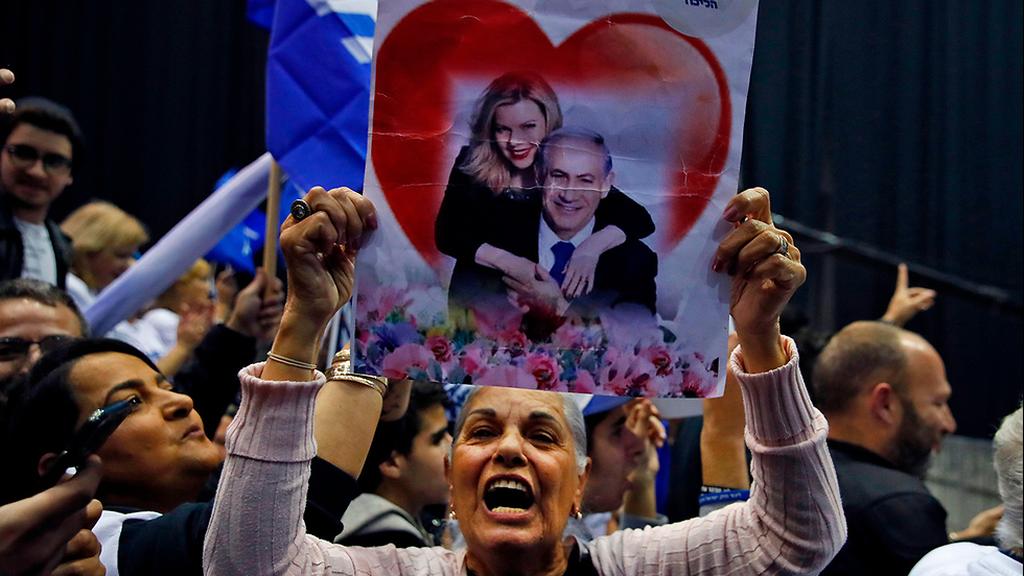

Celebrations at the Likud headquarters as exit polls from the March 2 elections are released
(Photo: AFP)
Former government officials and experts weigh in on the various political scenarios that might unfold in Israel in the coming months.
According to Ophir Pines Paz, former interior minister and current head of the Institute for Local Governance at Tel Aviv University, the chances of Netanyahu stepping down from his post as prime minister of his own free will in 15 months and handing the reins over to Gantz are “extremely slim.”
Pines Paz, who served with Netanyahu in the Knesset for over a decade, says Netanyahu “has no interest in the rotation happening, and based on recent polls, he has every incentive to head to an election.”
“Netanyahu isn’t missing any excuses; he’ll find thousands of them,” Pines Paz says.
“It all begins and ends with his trial. The rest is baloney, that’s the only thing that interests him. The only thing. He’ll find something to justify [an election], for visibility purposes – the budget or something else. They have disagreements on a daily basis, about everything, so an excuse won’t be the problem.”
According to Pines Paz, it’s not just a question of Netanyahu’s interests. With little public support after his decision to dismantle his party and join the coalition, Gantz might not have enough power to claim his place or force the prime minister to uphold his end of the bargain.
“Not enough voters are behind [Gantz], as opposed to the last time [an election was held], so there won’t be any major grumblings toward Netanyahu if he doesn’t stand by his word,” Pines Paz says.
“There might be some, but come on – nine seats [in the most recent poll]? Netanyahu sees those polls, too. A politician with no backing – there’s a question of legitimacy. Despite the agreement they have, in politics, agreements aren’t everything. When you go to court with a political pact, you probably won’t get judicial aid. It’s not a business deal.”
Pines Paz claims Gantz could have positioned himself better during the negotiation talks.
“He made two crucial errors,” he says. “The first one was that he didn’t demand that changes be made to the budget laws. Meaning that if the government doesn’t pass the annual budget deal by March, the coalition automatically dissolves and an election is held. Gantz didn’t exempt the current government from this. He’s not experienced enough and neither are the people around him.”
9 View gallery
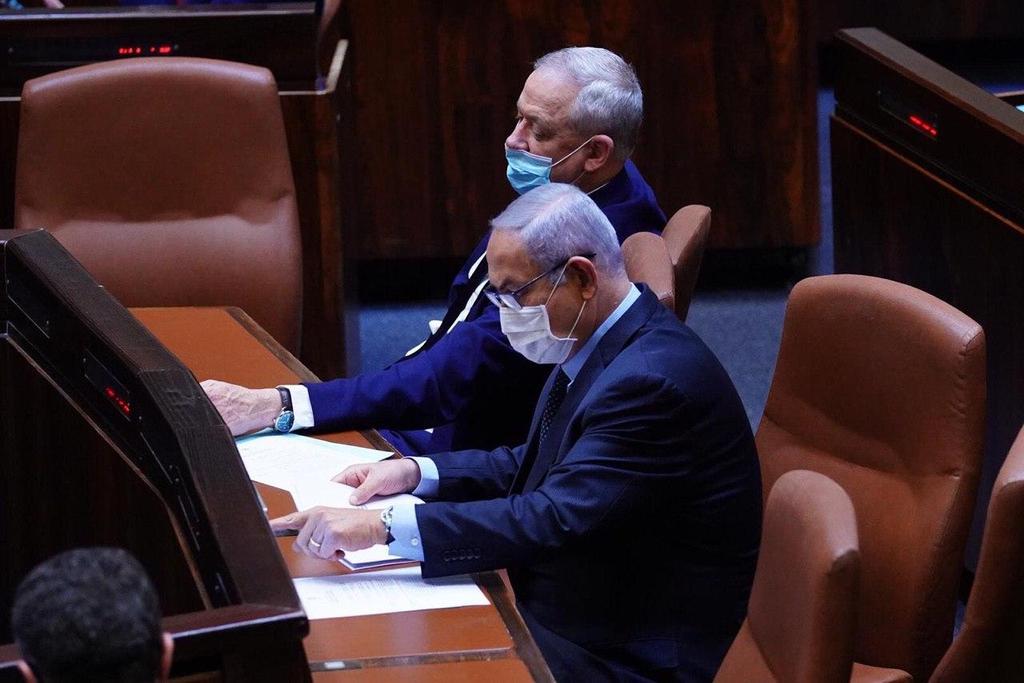

Benny Gantz and Benjamin Netanyahu sit together in the Knesset as joint heads of the govermnent
(Photo: The Knesset)
While the budget laws have indeed not been changed, the agreement signed by the two parties does offer Gantz some minimal insurance.
Firstly, it stipulates that if the parties do not reach an agreement before the March deadline, the side responsible for the holdup will be held accountable, with the opposite party taking control of (or keeping) the Prime Minister’s Office and receiving an additional three months to try to pass a budget.
The parameters by which it will be decided which party is to be blamed are ironically missing from the language.
Secondly, the pact states that the budget eventually agreed upon will be a biennial one, thereby sparing the coalition another battle at the beginning of next year.
“The second major mistake was not demanding that the Knesset chairman change when the prime ministers rotate,” Paz continues, pointing out the fact that instead of having his own party member presiding over the legislative branch, Gantz will be stuck with the current Likud MK, Yariv Levin.
“It could have offered [Gantz] some stability, if the rotation will in fact take place.”
So what are Gantz’s possible tools in facing this uphill battle? Can he do anything to leverage and force his way into the coveted office he was promised by Netanyahu?
“He is facing two optional paths right now," says Pines Paz.
"Either capitulate to Netanyahu’s every demand, back down from every argument so as not to hand him an excuse to break the government up. Or he could stand up for himself and fight for his beliefs, knowing full well it might lead to an election.
"If he chooses the first option, giving up on everything, public support for him will continue to erode till the legitimacy to go through with the rotation will be nonexistent. On top of that, until the election – which will be held whenever Netanyahu finds it convenient – Netanyahu will be able to act as he pleases within his government,” he says.
“On the other hand, if Gantz elects to stand up to Netanyahu and confront him on the issues, Netanyahu may opt for an election and not hold up his end of the bargain [i.e., rotation], but at least then, Gantz will have built up some public backing.
"So that instead of nine seats or less like the current polls show, he’ll face another election with north of 20 seats in the initial polls. I would advise him to act like there is no rotation agreement, to keep confronting Netanyahu and not back off of anything."
The bottom line, according to Pines Paz, is that another election cycle – the fourth in just two years – is inevitable.
“In politics, you never say never. Netanyahu will go for it unless it won’t be in his interests, because of certain developments that we maybe can’t foresee right now," he says.
"Say, the presidential elections: If [U.S. President Donald] Trump loses to [Democratic candidate Joe] Biden, that’s a change that will strengthen Gantz immensely. That’s a situation in which Gantz becomes the address [for the U.S. administration], in which case the Israeli public won’t allow Netanyahu to renege on their deal. It would take something of that magnitude to shift the balance, and in politics, anything could change, but right now it seems like Netanyahu will easily find an excuse.”
Prof. Tamar Hermann, a senior fellow at the Israel Democracy Institute, disagrees.
“The polls don’t show the whole picture,” she says. “While there is no one party threatening his lead, Netanyahu may face tough resistance from within his own right wing, especially after the way he treated the Yamina party [currently the only right-wing party in the opposition].”
Hermann points out the growing financial crisis and soaring unemployment numbers.
“The current economic situation doesn’t afford anyone the chance to gamble on their political future. When so many people are in such bad shape financially, it’s no time for a general election,” she says.
“The biggest question currently on the agenda is that of annexation,” she says, adding another factor into the mix.
“I doubt something significant will take place but Netanyahu is sure to present it as a major personal accomplishment. Anyway, that could also bring about aftereffects that may shift public opinion.”
All in all, Hermann doesn’t see another election as a high-probability scenario.
The combination of high tensions between the Likud and Yamina, the lack of a credible threat to Netanyahu which aided him in the past to motivate his base, and the uncertain financial and security situations, all point, in her eyes, to the simple conclusion: “If he opts for early elections, Netanyahu may just barely survive. I just don’t see why it would be in his interests.”
Michael Partem, co-founder and vice chairman of the Movement for Quality Government, tends to agree with this assessment.
“I don’t think the chances of elections are great, despite the bickering,” he says.
Borrowing a term from the world of nuclear deterrence, Partem sees the current political standoff as “a case of MAD [Mutually Assured Destruction]. Nobody has an interest [in another election]. As the trial progresses, there will be more acute attacks on the justice system [by Netanyahu]. It’s inevitable, a campaign orchestrated by Bibi for his benefit.”
To combat this and to prove to his supporters he was right in forming this coalition, Gantz does have some leverage, he says.
“Blue and White will take out the submarine card,” Partem says. “They will say, ‘You want to play with fire? So we’ll reopen the submarine investigation.’ Each side has a card to play.”
Partem does agree with Pines Paz (and with most everybody in the political sphere) that there is only one thing that interests Netanyahu these days.
“The overriding concern for him is the trial, his seat and holding on to power,” he says.
Still, Partem concedes that as we draw closer to the agreed-upon date for rotation of power, there is a growing chance of some trick being pulled out of some sleeve.
“Netanyahu can find any excuse – security matters, annexation, domestics, the rule of law – any number of matters,” to break up the government prematurely and head for elections.
9 View gallery


An Israeli child helps his father cast his vote in the March 2020 election in Tel Aviv
(Photo: MCT)
If that happens, Partem doesn’t see much chance for major change.
“The leadership [in Israel] is the most unworthy of my lifetime. They’re unwilling to make any reforms that would perhaps lead to more rational outcomes," he says.
"Have you heard about a commission to discuss why we had three elections in eighteen months and wasted all that money, with the same results? Nobody seems to be concerned or occupied with it. Nobody seems to be thinking of the long term. I imagine the results of the next elections will be the same as the last three.”
Article written by Uri Cohen
Reprinted with permission from The Media Line



